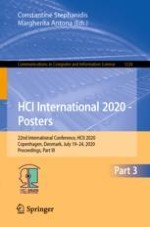
2020 | OriginalPaper | Buchkapitel
Brain-Computer Interaction and Silent Speech Recognition on Decentralized Messaging Applications
verfasst von : Luís Arteiro, Fábio Lourenço, Paula Escudeiro, Carlos Ferreira
Erschienen in: HCI International 2020 - Posters
Aktivieren Sie unsere intelligente Suche, um passende Fachinhalte oder Patente zu finden.
Wählen Sie Textabschnitte aus um mit Künstlicher Intelligenz passenden Patente zu finden. powered by
Markieren Sie Textabschnitte, um KI-gestützt weitere passende Inhalte zu finden. powered by